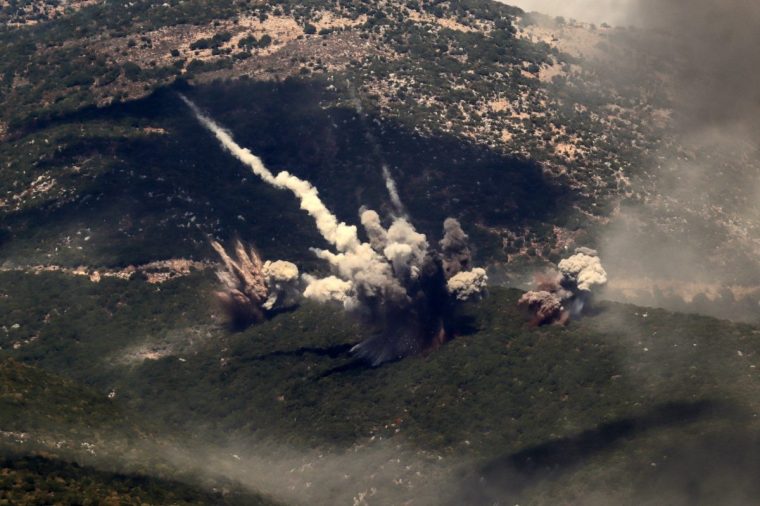Israel’s military has claimed a dozen senior Hezbollah commanders were killed by its air strike in southern Beirut yesterday.
Israel Defense Forces (IDF) claims the strike killed 16 Hezbollah members and 12 of its top commanders including Ahmed Wahb, who oversaw the military operations of the Radwan special forces during the Gaza war.
Before the attack, commanders are believed to have been attending a meeting in the basement of one of the buildings.
Israel has also implemented restrictions on gatherings in the country over fears of retaliatory attacks by Hezbollah – and this evening said it was “extensively” striking southern Lebanon – after being informed the terror group was “preparing to fire” towards the country.
In a post on X, formerly Twitter, the IDF claimed Hezbollah’s military chain of command has been almost “completely dismantled” by the atttack.
It added: “We will continue operating against any terrorist organization that poses a threat to our civilians on all fronts.”
Israel previously claimed the strike killed Ibrahim Aqil, Hezbollah’s head of operations, who had a $7 million bounty on his head for his role in the bombing of the US embassy in Beirut in 1983.

The IDF said the restrictions have been put in place in the north of the country, which will see gatherings limited to 30 people in an open area and 300 in a closed space.
People will still be allowed to go to work and educational activities will be able to continue as long as there is a “protected space” available.
This evening, a spokesman said the Israeli military had been “extensively” striking southern Lebanon for the past hour.
Rear Admiral Daniel Hagari said forces launched the strikes after detecting that Hezbollah was “preparing to fire” towards Israel.
“In the past hour, we have been striking extensively in southern Lebanon, following detection of Hezbollah preparing to fire toward Israeli territory,” he said.
“Dozens of Israeli Air Force aircraft are currently striking terrorist targets and rocket launchers to remove the threat to Israeli civilians.”
Lebanon’s health ministry claimed the number of people killed in the strike in southern Beirut ,which flattened two apartment buildings, has risen to 37.
Lebanon’s health ministry said among those killed in the Israeli air strike in Beirut were three children, and 68 others were wounded.
Discussing the attack, the Lebanese health minister, Dr Firass Abiad, said it was a “violation of international humanitarian law”.
“The fact is that those children and those women who were killed were not members of Hezbollah,” he said.
“Those were civilians that happened to be nearby”.
The conflict between Hezbollah and Israel continued to escalate today after communications devices used by the Iran-backed group exploded across Lebanon this week, killing 39 people and injuring thousands more.
The Israeli military pounded Hezbollah targets across Lebanon with artillery and fighter jet missiles.
The Israeli army said it hit around 180 targets, destroying thousands of rocket launch barrels
Hezbollah said it fired rockets at the “main air defence missile base” of the Israeli northern command and the Israeli military barracks in Zarit.
Nearly 100 rockets were launched from Lebanon at Israel, the IDF said, and it claimed they were primed for imminent attacks on Israel.
It said 25 rockets were fired towards Safed and Kiryat Shmona at 2pm local time in the first barrage.
By 3pm local time, 10 more rockets had been fired towards the Arab al-Aramshe area, and another 25 had been launched towards the Golan Heights.
A short time later, 30 more rockets were reported to have been fired at the Upper Galilee area.
There are no reports of any injuries but Israeli police said the rockets had caused damage and started fires.
Meanwhile in Gaza, an Israeli air strike on a school that had been sheltering displaced people killed 21 people, Hamas said
A spokesman for the Hamas-run civil defence agency, Mahmud Bassal, said more than half the dead at the Gaza City school were children.
He said: “Civil defence crews recovered [the bodies of] 21 people, including 13 children and six women, one of whom was pregnant.”
The IDF said the attack was “a precise strike on terrorists who were operating inside a Hamas command-and-control centre… embedded inside an adjacent school”.
It added that it had taken steps “to mitigate the risk of harming civilians, including the use of precise munitions, aerial surveillance and additional intelligence”.
US national security adviser Jake Sullivan admitted that he was worried about spiralling tensions between Israel and Lebanon but said that the Israeli killing of Aqil was “a good outcome”.
He said: “That individual has American blood on his hands and has a Rewards For Justice price on his head.
“You know 1983 seems like a long time ago,” Mr Sullivan said. “But for a lot of families and a lot of people, they’re still living with it every day.”


Maurice Saatchi: I used to adore capitalism – then I had lunch with Margaret Thatcher